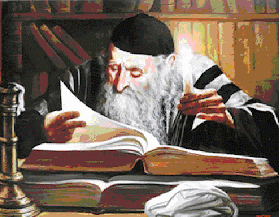 |
Anyway, one of the (slightly) different things about this campaign is the way I'm treating alignment. Rather than doing away with the concept altogether, except for extremes of good and evil (as I often do) alignment with be replaced by moral codes and religions. This is still a work in progress at the moment, but the options at present are:
Religious Alignment Choices:
- Medieval Catholicism
- Medieval Islam
- Medieval Druidism/Paganism
- Medieval Judaism
- Medieval Orthodox
- Servant of the Dark One (NPC Only)
So, these five choices aren't quite the straight-jacket they might first appear to be.
Then we have the (sometimes) more restrictive, properly fixed moral codes:
 |
| Rashi, perhaps the best known medieval Rabbi and Scholar |
Moral Alignment Choices:
- Athiest/Agnostic
- Chivalric Code
- Humanist
- Irreligious
- Secular Devotion
Lastly, we have Secular Devotion, which implies an utter adherence to an NPC secular authority such as the King, a Duke or Earl or even simply a friend or loved one. The limitation here is that the character won't do anything to act against the interests of the object of his devotion, but at the same time the character would be reluctant to disobey any instructions from this same NPC, regardless of how abhorrent. Most of the lower-end bad-guy NPC's in this game will have this alignment, which is very similar to lawful neutral in many respects.
Finally, we have good and evil
 |
| Salahadin: A great example for Islamic Paladin characters |
Good and Evil:
Good and Evil, Law and Chaos no longer exist in an alignment sense, but they do still have a place in the game world. Generally, for a creature of being to be affected by such as a spell, they must have a history of routinely acting in a certain way. For example, angels and demons are always affected by spells that affect good and evil creatures respectively. A knightly character who consistently acts to uphold the law and maintain stability in the land (regardless of his actual alignment) would be affected by spells such as Protection from Law. A robber-knight on the other hand (or one notorious for changing sides during the Wars) would be affected by Protection from Chaos and so on.
Alignment and Clerics:
Clerics, strictly speaking, can be of any alignment, not just the alignment of their religion. However, if they wish to retain their spell casting abilities, they had better ensure that their actions remain consistent with the tenants of the religion they represent. Thus, a Catholic cleric might have the Secular Devotion alignment, and be devoted to the service of his brother, an NPC Lord. He might politic and preach on his brothers behalf without effect, but if he arranges the assassination of his brother's enemies, he can kiss those clerical abilities of his good-bye.This helps to explain why so many priests in the historical time period (and setting) can act contrary to the interests of their religion and still remain priests. In a gaming sense, the ones that manage to obey the tenants of their religion can perform minor miracles. The ones who betray their religious beliefs in favour of more secular or personal concerns, lose their powers. Often very early in their clerical careers. The few who manage to exist in the secular world and remain true to their faith are essentially minor miracle workers, moving to become widely recognised as living saints (or prophets) at higher levels.
 |
| Pope John XXIII. A fine example of a priest who most definitely would have lost his cleric powers in this setting. |

DR EMU YOU ARE REALLY GREAT. I WILL KEEP COMING TO YOU WHEN EVER I NEED YOUR HELP.
ReplyDeleteWEBSITE: HTTPS://EMUTEMPLE.WORDPRESS.COM
WHATS APP: +2347012841542
I want to thank DR EMU for the wonderful work he done for me and my family, i was having a serious breakup with my ex but when i contacted him for help he brought him back to me with his historical powers, and also helping me to get a job, since he cast his spell for me things has really be good to me and since i know him my husband has been faithful to me, well i will say that this man is a really great spell caster that every one must contact for help, if you are facing breakup or marriage problem just contact this man for help he will help you settle everything with his power, please contact him on his email: emutemple@gmail.com once you contact him all your problems will be solve.